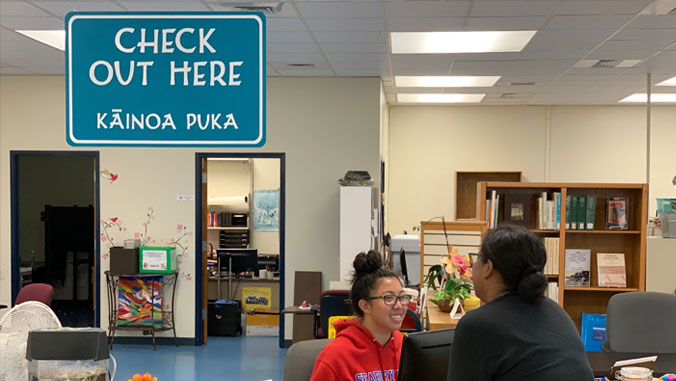
A research study by five Hawaiian librarians at the University of Hawaiʻi has led to 14 recommendations to UH administration and library leadership to suggest more meaningful support of the research and teaching practices of Hawaiian studies and Hawaiian language faculty.
“This report highlights the integral role that the UH System libraries have in helping the university become the foremost authority on Native Hawaiian scholarship,” said Sarah Sur, head librarian at Windward Community College. “Many of our campus libraries have made significant impacts toward this individually, however, this report is a collective call to all campus libraries to work together on addressing the issues, concerns and initiatives discussed in the report.”
“As the University of Hawaiʻi pushes forward to become the world’s foremost indigenous serving university, we needed to learn how established faculty members approach, conduct and teach research,” said study co-author Kawena Komeiji, a Hawaiian Pacific Resources librarian at the University of Hawaiʻi–West Oʻahu. She said, unlike traditional academic research, Hawaiian studies scholars embed Hawaiian values and protocols into all aspects of the research process. Elements like kūlana (station, rank), pule (prayer), kuleana (responsibility) and mana (authority) interact with each other, creating a process that is unique and distinctly Hawaiian.
The study was conducted over a year and a half by Komeiji, Keahiahi Long (Kamakakūokalani Center for Hawaiian Studies at UH Mānoa), Shavonn Matsuda (UH Maui College), Annemarie Paikai (Leeward Community College) and Kapena Shim (UH Mānoa). Interviews took place with 17 Hawaiian studies and Hawaiian language faculty members selected on the basis of their tenure and affiliations.
“Hawaiian scholars navigate through a complex information landscape, complicated more by external obstacles, such as the policies of repositories or the inaccurate or lack of representation and discoverability of Hawaiian perspectives and materials in Western knowledge organization systems,” said Matsuda. “In response, Hawaiian studies and language faculty are establishing a strong research foundation for undergraduate students with assignments focused on connections to ʻāina, ʻōlelo Hawaiʻi, genealogy and contemporary political issues. Often, this research is framed as self-discovery, in which students are taught to use research to develop an understanding of who they are in relation to the broader lāhui (Hawaiian nation).”

